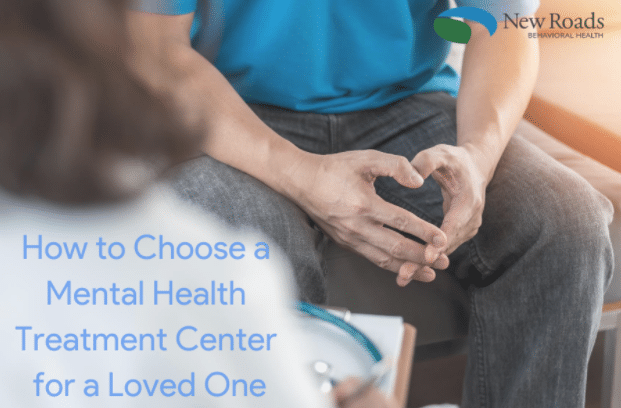The stigma around mental health can sometimes make those struggling feel even more alone.
When depicting the right mental health treatment center for a loved one, you want to find a supportive and nurturing environment. That could mean many different things depending on each person.
You’ll want to take multiple things into account before making the decision. Does your loved one need long term care? What is the staff’s expertise like? What type of treatment strategies does the facility use? What type of support system do they implement for your loved ones?
It’s difficult to watch those you love struggle with mental illness. When it comes to choosing a mental health treatment center for a loved one, there’s a lot to consider. As it’s a large thing to take on and potentially a life altering decision.
At New Roads Behavioral Health, we implement multiple factors into our treatment program. Creating specific mental health treatments tailored to your loved ones. Making your choice a little more easy. Getting them the best possible treatment they need can be just around the corner.
Treatment Programs

Since there does tend to be a stigma around mental health, reassuring your loved ones that treatment can be effective and help them is important for them to hear.
With multiple research projects done around the treatment of mental health, there’s an overwhelming amount of evidence to back up the idea of positive outcomes.
Mental health treatment centers are known to reduce symptoms in those with mental illness.
Which in turn creates longer lifespans. Without the correct treatment, your loved one may live with worsened overall health. Get them the assistance they need to treat and heal from mental illness.
Though it’s proven that mental health treatment may help, that’s only for evidence-based care. Not all types of care. That’s why when it comes to choosing the right treatment center for your loved one, you should do your research!
Residential
If you’re looking into choosing a mental health treatment center for a loved one, that probably means you’ve tried other alternatives to get them help.
The great part about choosing a residential treatment program, is that it provides a larger selection of treatment programs.
This is considered one of the better options for those with mental illness. Being able to adapt and change their treatment plan when needed is helpful.
This is because when it comes to treating mental illness long term, outpatient care and in therapy sessions don’t always show improvement. Not that therapy isn’t effective, but going to a counselor for long periods of time and still struggling with the same mental illness may go to show it’s not enough treatment wise.
For a lasting treatment and improvement in mental health, more thorough care is probably needed. Providing things that outpatient care may not be able to. Such as:
- Behavioral Therapies
- Medical Care
- Other Creative Therapies
- Mutual Peer/Group Support
On top of many other reasons, another plus of inpatient care is that it creates a safe place to stay and heal. Learning to cope with mental illness can be scary and sometimes even life threatening.
With around the clock care and free of outside life distractions. Like family, friends, work, or maybe school. Not having these things weighing on you while trying to treat mental illness can influence a healthy, successful healing process.
With all this free time for your loved one to focus on themselves and getting better. They have the opportunity to learn healthy coping mechanisms, canceling out previous negative thoughts and actions.
This is a lot more valuable over time than outpatient care. Giving your loved one the chance to manage their mental health before going back to day-to-day life and it’s influences. Knowing how to cope and manage with their symptoms is key to healing.
Evidence Based
So, yes it is proven that treatment for mental illness can show improvement. The catch is they have to be the right treatment program for your loved one.
Before deciding on one, the key is to figure out which therapies each facility is using. The outcome they have of treating patients and if they’re backed by science based research,
All good mental health treatment centers should have at least the foundational behavioral therapies.
One of the most well-known and standard being cognitive behavioral therapy, should be available in treatment plans. Commonly used and able to modify for those with personality, or trauma based mood disorders.
Though cognitive behavioral therapy has helped a good amount of varying mental health problems. It works by first recognizing negative traits of thinking and behavior. Then by modifying those patterns to healthier ones.
Helping your loved ones set future goals and create better stress induced responses. Creating a better mindset to deal with hard situations in the future.
A study found that cognitive behavioral therapy showed long-term effectiveness in managing symptoms for those patients with depression who did not respond to medications.
Individualized
When choosing a mental health treatment center for a loved one, you never want them to be treated as the whole. Everyone struggling with mental health disorders will usually require an individualized and personalized treatment to see improvement.
While looking at different facilities, the best ones should include a full assessment upon introduction to their program. Before your loved one has a treatment plan created, they need to be properly diagnosed.
After the diagnosis, then the treatment plan should be created. This should be specifically built around each person’s diagnosis. When it comes to mental illness it can be easily stigmatized under larger categories of disorders.
Even if it’s the same mental illness as another person, they affect everyone differently. Which then requires different treatment plans. That’s why choosing a treatment center with many different therapy programs is a good idea.
Once treatment programming is decided, you need to ensure it includes all of the following about your loved one:
- Their complete background.
- Patient’s diagnosis.
- Physical health history.
- Preferences of treatments.
This assessment before treatment is essential to making sure all mental health issues are included. Dual-diagnosis is more common than people think. There could be more than one underlying mental health disorder, or substance abuse disorder.
Treating both at the same time is essential to possible recovery for your loved one. Hopefully by diagnosing and treating all conditions creates a lower chance of relapse in the future.
At New Roads Behavioral Health, we specialize in dual diagnosis with our residential treatment programs and therapies.

